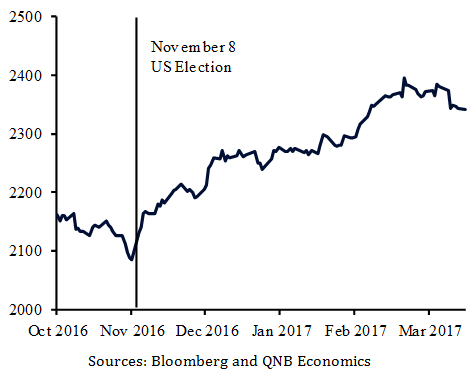The election of President Trump and the prospect of fiscal stimulus spurred considerable optimism about US growth in 2017. US equity markets jumped in the weeks following the US election, in what financial markets termed the “Trump trade”. But optimism has since tempered. The latest indications from the Trump administration suggest that most of the stimulus will be delayed to 2018 and also the size of the stimulus could be less than anticipated. Despite that, a strong labour market and robust investment should keep US growth resilient.
S&P 500 (Index, 1941-43 = 10)

Sources: Bloomberg and QNB Economics
We believe there are three key reasons why stimulus is unlikely to materialise in 2017. First, the boost to infrastructure spending promised during the campaign has been excluded from the spending plans announced thus far. On March 13th, the administration released its “skinny budget,” an outline of discretionary spending in 2017 and 2018. Although discretionary spending accounts for only about 30% of federal government spending, this is where new infrastructure spending measures typically appear. Trump’s skinny budget offered increased spending of USD15bn in 2017 or just 0.1% of GDP. The increase is based entirely on higher defence and security spending (USD33bn) more than offsetting planned cuts to non-defence ministries (USD18bn). More details could emerge about infrastructure once the administration submits its official budget to Congress which is expected in the coming months.But even then, considering the time it will take to get the budget bill passed, it is likely that actual implementation will occur in 2018.
Second, tax cuts, the largest component of the expected fiscal stimulus,are likely to be implemented towards the end of the year at the earliest. In February, US Treasury Secretary Steve Mnuchin announced August as a target date for passing tax legislation. If fulfilled, the enactment date should follow closely and the impact oftax cuts would be felt primarily in Q4 2017 and through 2018. However, passing tax legislation is likely to be contentious. On corporate taxes, the administration floated the idea of a border adjustment tax earlier this year (see our past commentary Trump and Trade) which was viewed as an implicit protectionist measure because it taxed imports, drawing criticism from inside and outside the US. Meanwhile there have been very limited clues and no specific details about what reforms on income taxes would look like so far. Hence, the lack of clarity and diverging views on policy could prolong the approval process, delaying tax cuts to early 2018.
Third, political opposition is likely to constrain the implementation of the President’s agenda in 2017. Despite Republican control of both the House and the Senate, the emergence of internal party divisions has made it difficult for President Trump to get legislation passed. In particular, this has come from a group of hardline fiscal conservatives in the Republican party, concerned about the prospect of higher US public debt. This was highlighted in the recent healthcare debate in the US where the administration withdrew a proposed reform bill because of a lack of support from the group on concerns about over spending. These divisions could very well play out again in debates on the budget and tax bills, resulting in further concessions and ultimately a reduction in the size of the stimulus.
The key implication of later and less stimulus is that growth will be slightly lower in 2017 and higher in 2018 than previously perceived.But even without fiscal stimulus in 2017, the US economy remains on firm footing. Unemployment is below 5.0%, wage growth is close to 3.0% and core inflation continues to firm. Moreover, private investment in the US has begun to rebound, recording its first year-over-year increase in Q4 2016 in over two years.Given the underlying strength of the US economy,a delayed fiscal stimulus may not imperil growth after all.
